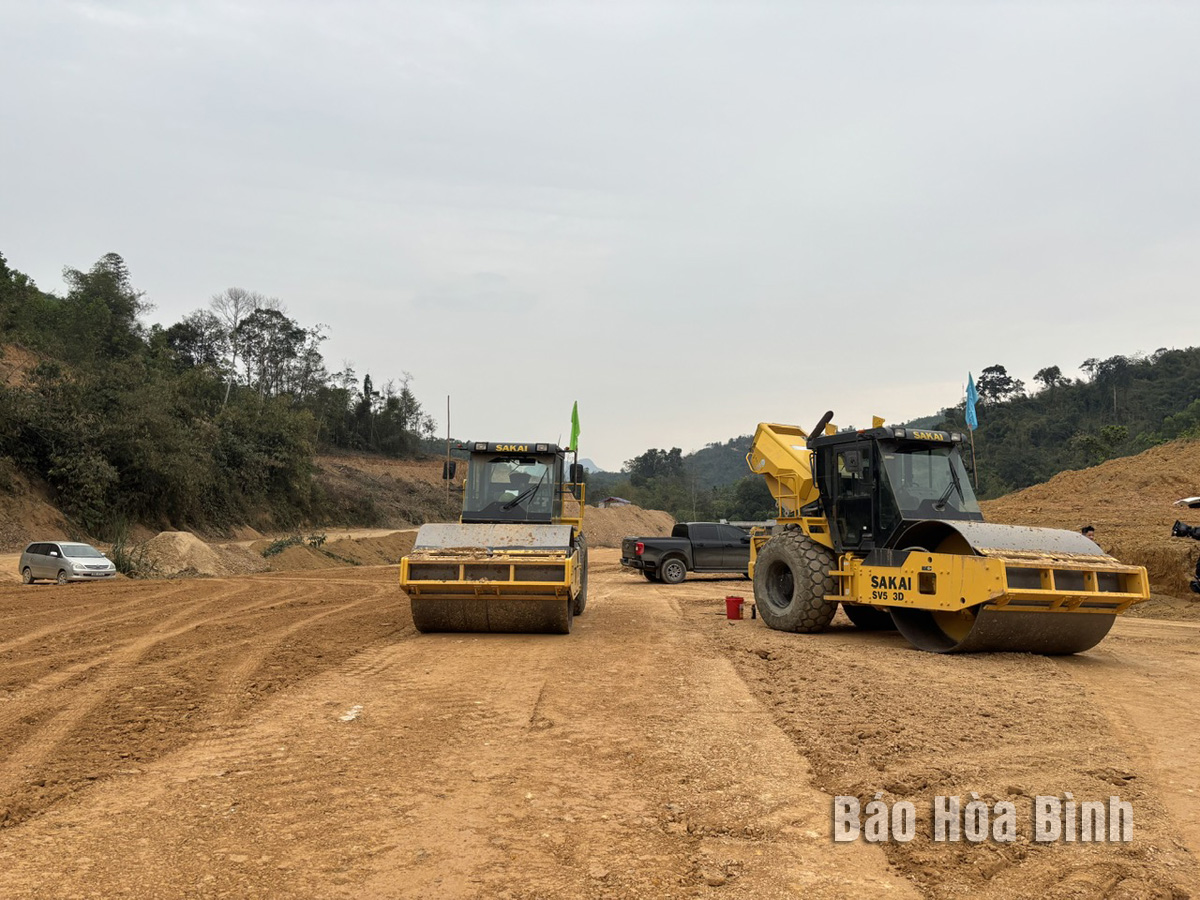
Hoa Binh province’s economy posted an impressive Gross Regional Domestic Product (GRDP) growth rate of 12.67% in the first quarter of 2025, representing a 12.76% year-on-year increase, the highest rate recorded since the beginning of the current tenure, according to the provincial Statistics Office. This robust growth reflects years of strategic groundwork and sets a strong foundation for the province’s annual growth target of over 10%.
The implementation of key projects has contributed to promoting the province's economic growth. Photo: Construction of a road which passes through Cao Son commune (Luong Son district) is underway.
By sector, the industry and construction segment led the way, expanding by
27.18% and contributing 9.92 percentage points to the overall growth. Within
this, industrial output alone surged by 33.1%, accounting for 9.4 percentage
points. Meanwhile, the agro-forestry and fisheries sector grew by 4.19%
year-on-year, contributing 0.76 percentage points, and the services sector
expanded by 5.91%, adding 2.37 percentage points.
The service sector, which makes up about 34.6% of the province’s GRDP, received
a significant boost thanks to the launch of new tourism destinations. The
province has made key investments in port infrastructure and road systems
surrounding the Hoa Binh Lake tourist site, while also restoring cultural and
historical landmarks to attract more visitors. These developments have also
driven notable growth in related industries: wholesale and retail trade
increased by 8.93%, accommodation and food services by 17.36%, and
transportation by 21.09%.
Although Q1 marks the beginning of a new agricultural crop, high-efficiency
production models and value chains continued to thrive. Authorities have also
maintained a strong focus on ensuring food safety and the quality of
agricultural inputs. Hoa Binh currently boasts 158 One Commune One Product
(OCOP) items rated between 3 and 4 stars, including seven products that have
been shipped abroad, further bolstering the province’s agricultural output.
Nguyen Khanh Son, deputy head of the provincial Statistics Office, emphasised
that this strong performance was not a short-term spike but rather the result
of sustained, long-term planning and consistent effort.
Hoa Binh aims to achieve a minimum growth rate of 10% in 2025, surpassing the
national target. To meet this goal, provincial authorities have instructed
departments and localities to conduct thorough assessments, enhance forecasting
capabilities, and deploy timely and effective solutions.
Key measures include accelerating investment in transport, industrial park
infrastructure, and digital transformation, while assigning clear growth
targets to each sector and locality with specific quarterly and biannual scenarios.
Building on the momentum from Q1, Hoa Binh anticipates strong growth in Q2 as
well. The province plans to commence several major projects, including the Xuan
Thien Hoa Binh lime and light powder production plant, new golf courses and
urban development projects in Luong Son district and Hoa Binh city, and a
large-scale eco-tourism and resort complex by Sun Group. At the same time,
local authority will continue to roll out measures to stimulate domestic
consumption, renew trade promotion activities, and ramp up export efforts,
particularly targeting key international markets.
However, Son also acknowledged several ongoing challenges.
External factors, such as US tariff policies, have negatively impacted export
performance. Meanwhile, delays in land clearance, public investment
disbursement, and the implementation of national target programmes remain
obstacles to sustained economic progress.
To maintain growth momentum, he stressed the need to further improve the local
business climate, attract more investment, and accelerate the development of
the processing and manufacturing industries. Continued support for agriculture
and services will also be essential, along with bold and timely actions to
resolve bottlenecks and fast-track public investment, especially for large-scale
and strategic provincial projects, Son added.
In Lac Thuy district, communes have been succeeded in promoting their One Commune-One Product (OCOP) products while others are still struggling to position their typical farming products in market. Some communes in the district still fail to have their products met OCOP programme’s requirements, while others have seen their certifications expired.
The inspectorate agency of Hoa Binh province has issued Official Dispatch No. 1090/TTr-PCTN to provincial departments, agencies, localities, business associations, enterprises, and investors regarding measures to improve informal component indexes of the Provincial Competitiveness Index (PCI).
Hoa Binh is taking concrete steps to improve its investment environment, with a strong focus on supporting businesses, settling obstacles for strategic investors, and creating opportunities for robust development in the coming years.
Under the blazing early summer sun, the construction site of Nhuan Trach Industrial Park (IP) in Luong Son district is abuzz with activities from dawn to dusk, a testament to the determination of the investor to meet their construction targets on schedule.



